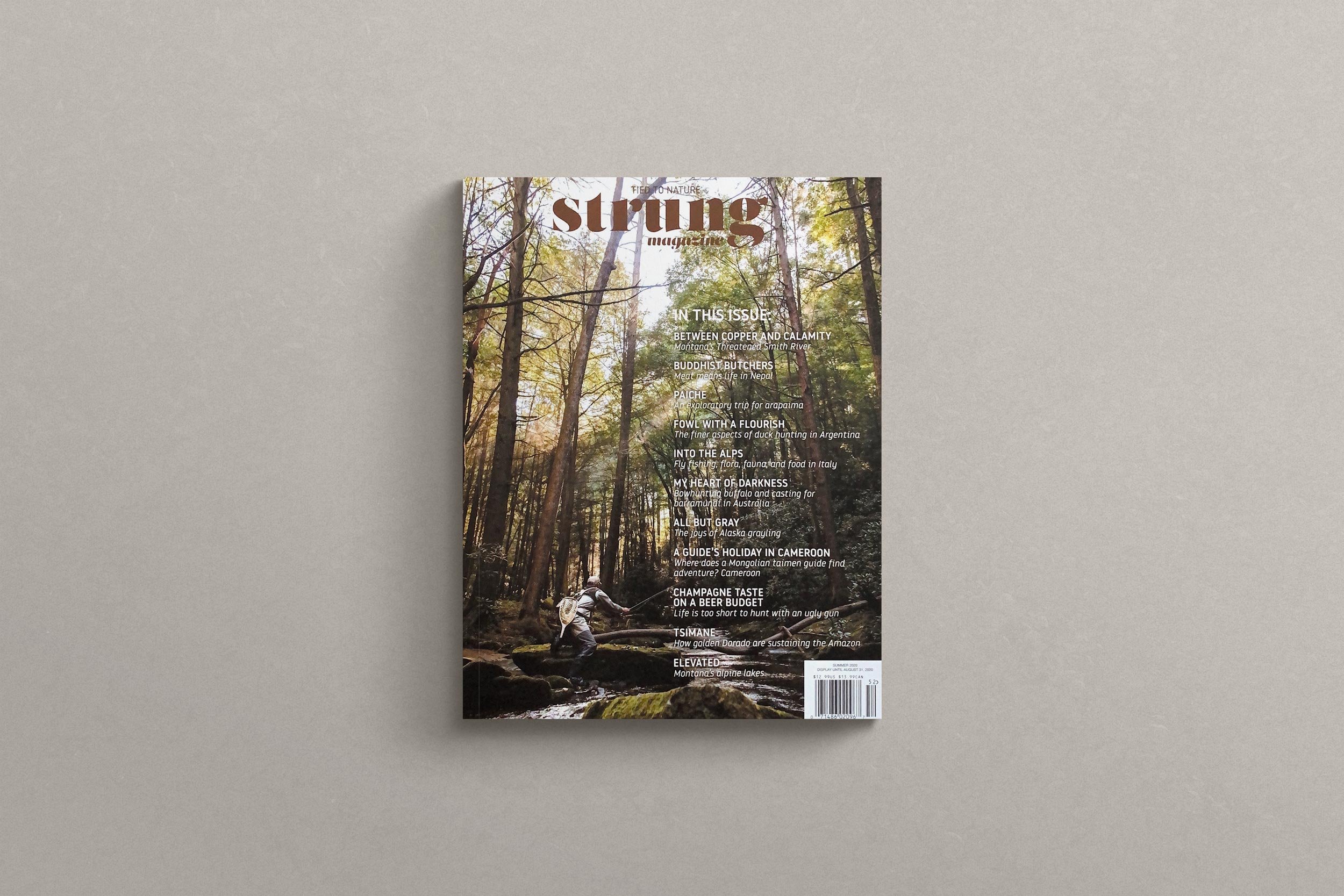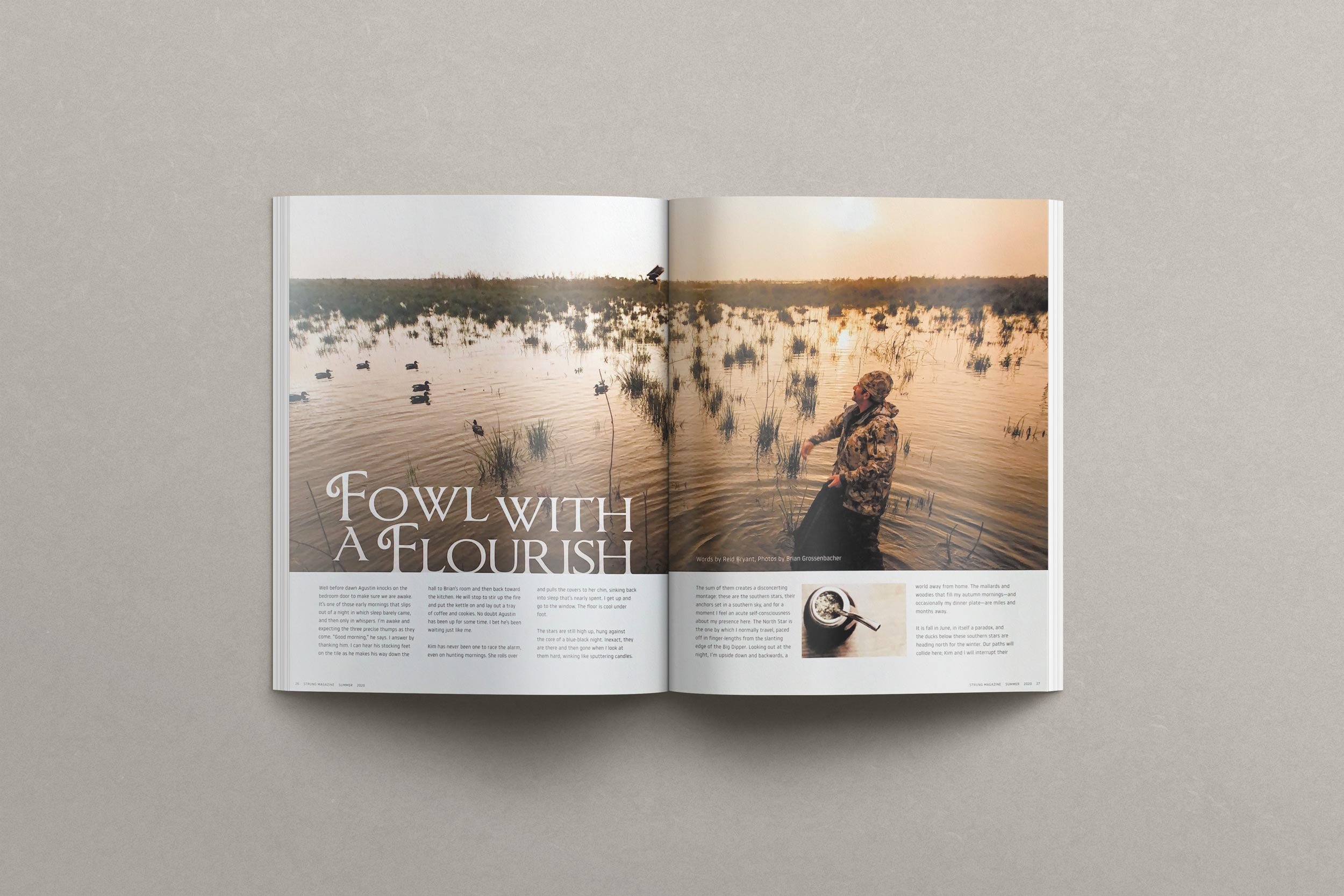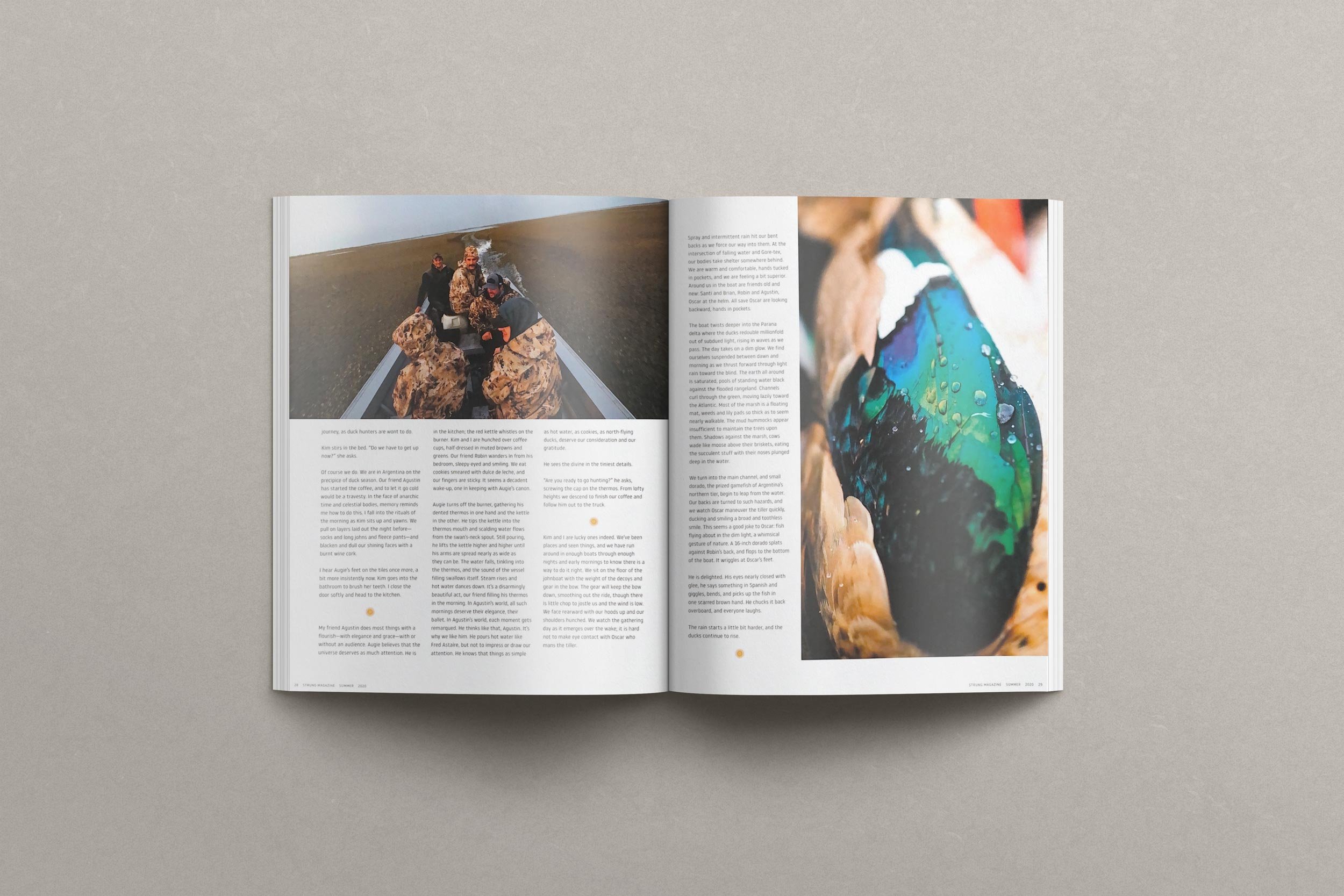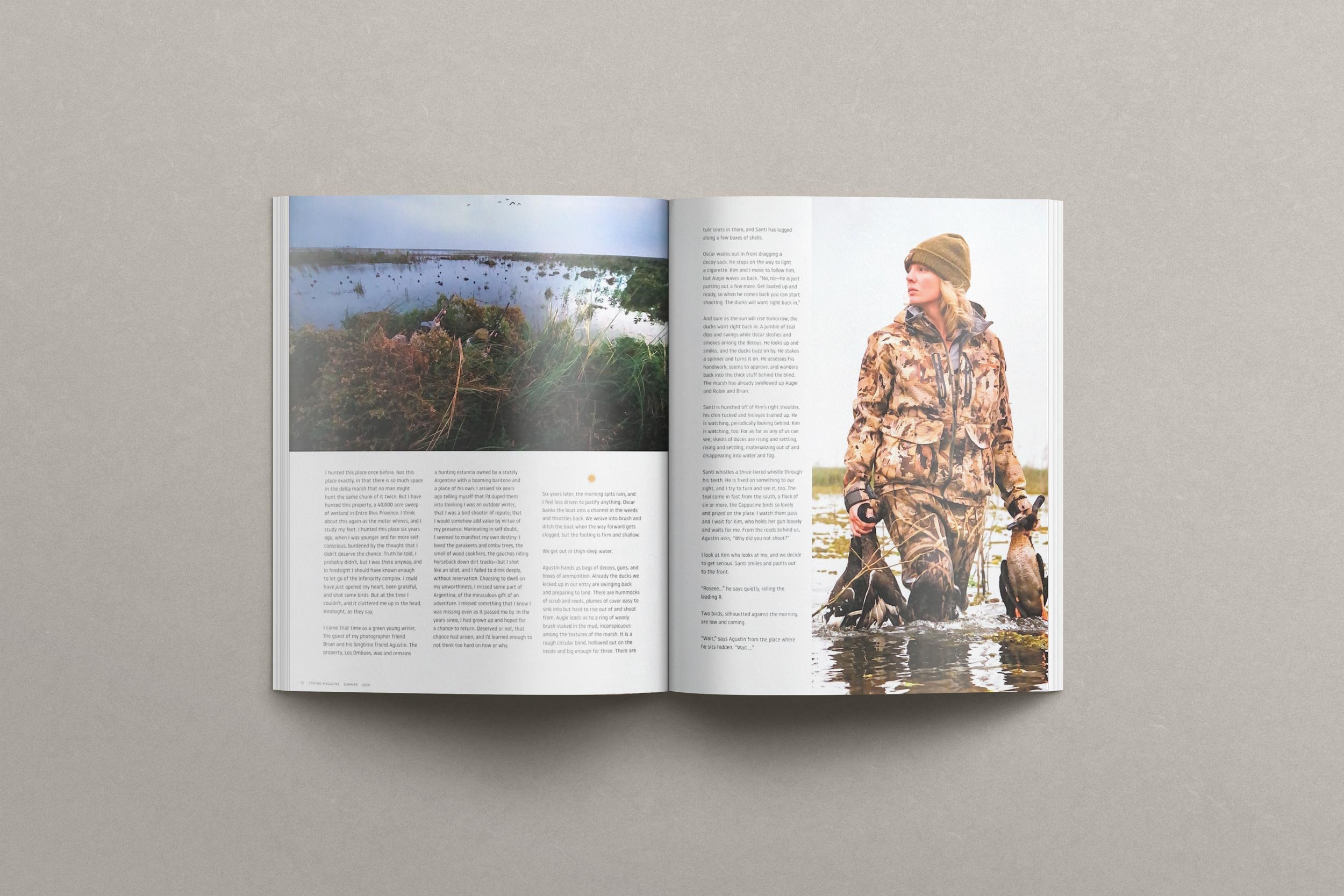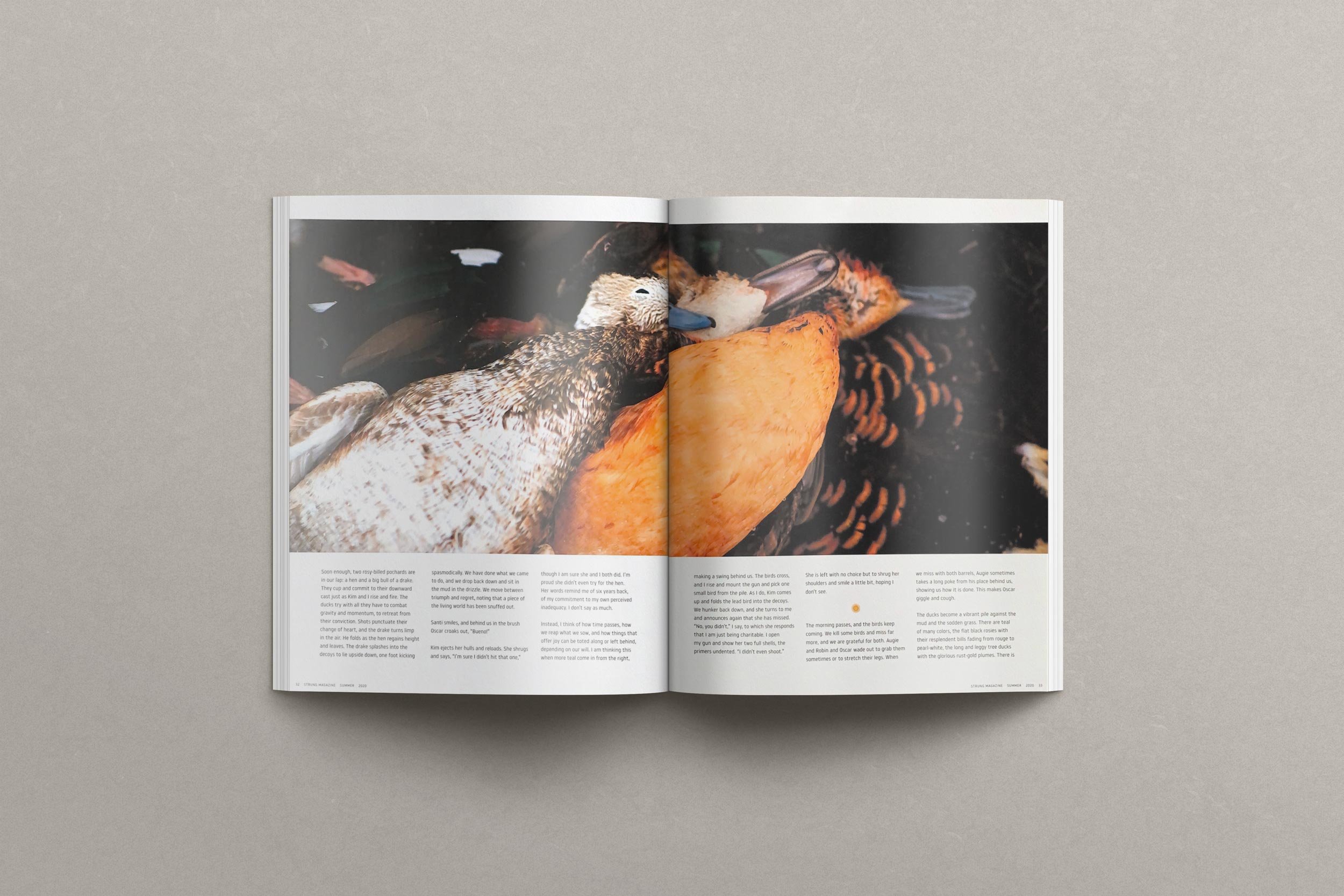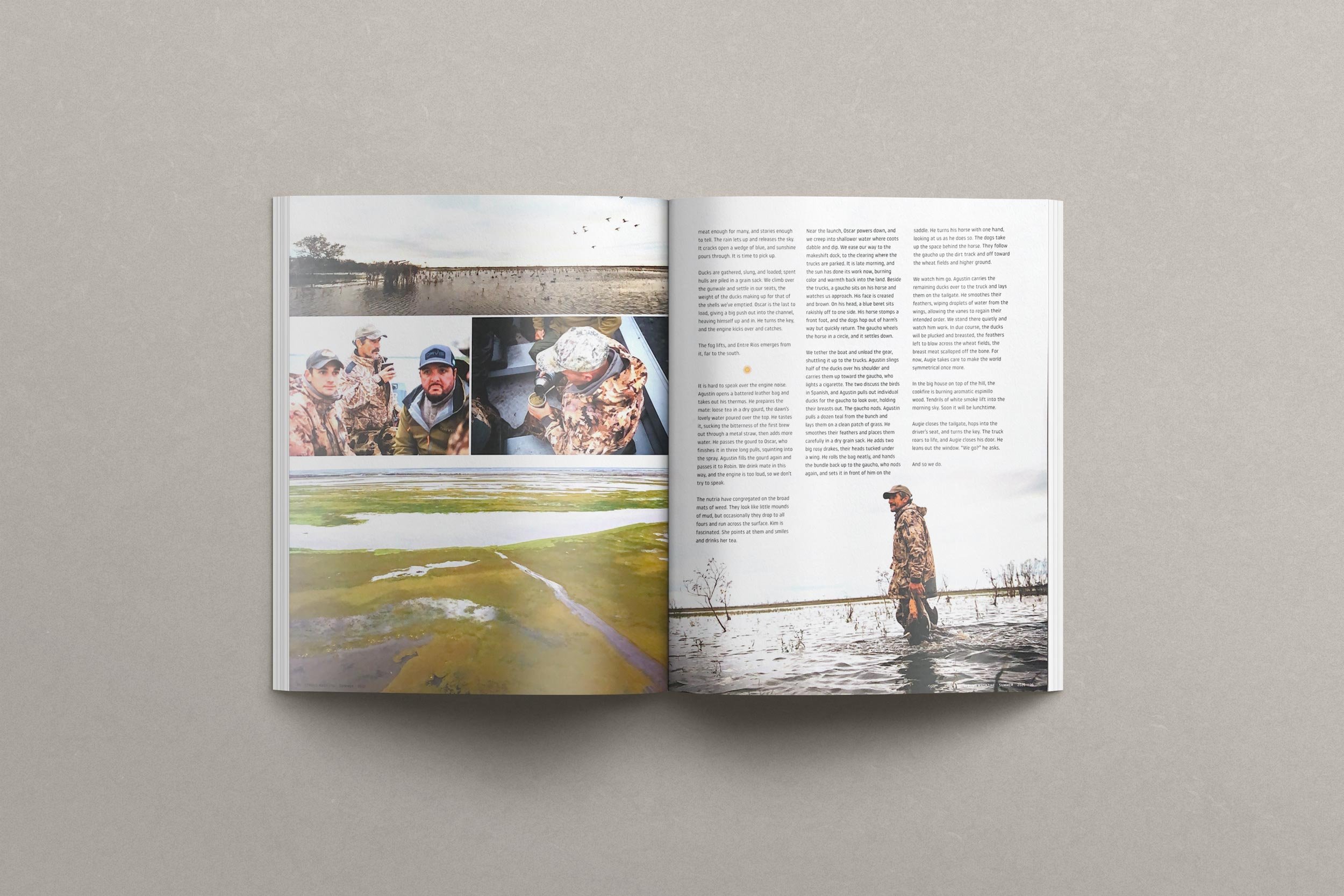Fowl With Flourish
Well before dawn, Agustin knocks on the bedroom door to make sure we are awake. It’s one of those early mornings that slipped out of a night in which sleep barely came, and then only in whispers. I’m awake and expecting the three precise thumps as they come. “Good Morning,” he says. I answer by thanking him. I can hear his stocking feet on the tile as makes his way down the hall to Brian’s room, and then back towards the kitchen. He will stop to stir up the fire and put the kettle on and lay out a tray of coffee and cookies. Agustin, no doubt, has been up for some time. I bet he’s been waiting just like me.
Kim has never been one to race the alarm, even on hunting mornings. She rolls over and pulls the covers to her chin, sinking back into sleep that’s nearly spent. I get up and go to the window. The floor is cool underfoot.
The stars are still high up, hung against the core of a blue-black night. Inexact, they are here and gone when I look at them hard, winking like sputtering candles. The sum of them creates a disconcerting montage: these are the southern stars, their anchors set in a southern sky, and for a moment I feel an acute self-consciousness for my presence here. The north star is the one by which I normally travel, paced off in finger-lengths from the slanting edge of the Big Dipper. Looking out this night window I’m upside down and backwards, a world away from home. The mallards and woodies that comprise my autumn mornings, and on occasion fill my dinnerplate, are miles and months away.
It’s Fall in June, in itself a paradox, and the ducks below these southern stars are heading north for the winter. Our paths will collide here; Kim and I will interrupt their journey, as duck hunters are wont to do.
Kim stirs in the bed.
“Do we have to get up now?” she asks.
Of course we do. We are in Argentina on the precipice of duck season. Our friend Agustin has started the coffee, and to let it go cold would be a travesty. In the face of anarchic time and celestial bodies, memory reminds me how to do this. I fall into the rituals of the morning, as Kim sits up and yawns. Socks and long johns and fleecey pants, the layers laid out the night before, a wine cork burnt to blacken and dull our shining faces.
I hear Augie’s feet on the tiles once more, a bit more insistently now. Kim goes into the bathroom to brush her teeth. I close the door softly and head off towards the kitchen.
*
My friend Agustin does most things with a flourish, but one not tailored towards an audience. In his world, things are done a certain way, with elegance and grace. To Augie, the universe deserves as much attention.
He is in the kitchen; the red kettle whistles on the burner. Kim and I are hunched over coffee cups, half-dressed in muted browns and greens. Our friend Robin wanders in from his bedroom, sleepy-eyed and smiling. We eat cookies smeared with dulce-de-lece, and our fingers are sticky. It seems a decadent wake-up, one in keeping with Augie’s canon.
He turns off the burner, gathers his dented thermos in one hand and the kettle in the other. He tips the kettle into the thermos mouth and scalding water flows from the swan’s-neck spout. Still pouring, he lifts the kettle higher and higher till his arms are spread near as wide as they can be. The water falls, tinkling into the thermos, and the sound of the vessel filling swallows itself. Steam rises and hot water dances down. It’s a disarmingly beautiful act, our friend filling his thermos in the morning. In Agustin’s world, all such mornings deserve their elegance, their ballet. In Agustin’s world, each moment gets remarqued. He thinks like that, Agustin. It’s why we like him. He pours hot water like Fred Astaire, but not to impress or draw our attention. He knows that things as simple as hot water, as cookies, as north-flying ducks, deserve our consideration and our gratitude.
The divine in the tiniest details.
“Are you ready to go hunting?” he asks, screwing the cap on the thermos.
From lofty heights we descend to finish our coffee and follow him out to the truck.
*
Kim and I are lucky ones indeed. We’ve been places and seen things, and we have run around in enough boats through enough nights and early mornings to know there is a way to do it right. We sit on the floor of the johnboat with the weight of the decoys and gear in the bow. The gear will keep the bow down, smoothing out the ride, though there is little chop to jostle us and the wind is low. We face rearward with our hoods up and our shoulders hunched. We watch the gathering day as it emerges over the wake; it is hard not to make eye contact with Oscar who mans the tiller.
Spray and intermittent rain hit our bent backs as we force our way into it. At the intersection of falling water and Gore-tex, our bodies take shelter somewhere behind. We are warm and comfortable, hands tucked in pockets, and we are feeling a bit superior. Around us in the boat are friends old and new; Santi and Brian, Robin and Agustin, Oscar at the helm. They are all looking backward, hands in pockets, save for Oscar.
The boat twists deeper into the Parana delta where the ducks re-double million-fold out of subdued light, rising in waves as we pass. The day takes on a dim glow. We find ourselves suspended between dawn and morning as we thrust forward through light rain towards the blind. The earth all around is saturated, pools of standing water black against the flooded rangeland. Channels curl through the green, moving lazily towards the Atlantic. Most of the marsh is a floating mat, weeds and lily pads so thick as to seem nearly walkable. The mud hummocks seem insufficient to maintain the trees upon them.
Shadows against the marsh, cows wade like moose above their briskets, eating the succulent stuff with their noses plunged deep in the water.
We turn into the main channel, and small dorado, the prized gamefish of Argentina’s northern tier, begin to leap from the water. Our backs are turned to such hazards, and we watch Oscar maneuver the tiller quickly, ducking and smiling a broad and toothless smile. This seems a good joke to Oscar: fish flying about in the dim light, a whimsical gesture of nature. A sixteen-inch dorado splats against Robin’s back, and flops to the bottom of the boat. It wriggles at Oscar’s feet.
He is delighted.
His eyes nearly closed with glee, he says something in Spanish and giggles, bends, and picks up the fish in one scarred brown hand. He chucks it back overboard, and everyone laughs.
The rain starts a little bit harder, and the ducks continue to rise.
*
I hunted this place once before. Not this place exactly, in that there is so much space in the delta marsh that no man might hunt the same chunk of it twice. But I have hunted this property, a 40,000 acre sweep of wetland in Entre Rios Province.
I think about this again as the motor wines, and I study me feet. I hunted this place six years ago, when I was younger and far more self-conscious, burdened by the thought that I didn’t deserve the chance. Truth be told, I probably didn’t, but I was there anyway, and in hindsight I should have known enough to let go of the inferiority hang-up. I could have just opened my heart, ben grateful, and shot some birds. But at the time, I couldn’t, and it cluttered me up in the head. Hindsight, as they say.
I came that time as a green young writer, the guest of my photographer friend Brian, and his longtime friend Agustin. The property, Los Ombues, was and remains a hunting estancia owned by a stately Argentine with a booming baritone and a plane of his own. I arrived six years ago telling myself that I’d duped them into thinking I was an outdoor writer, that I was a bird shooter of repute, that I would somehow add a value by virtue of my presence. Marinating in self-doubt, I seemed to manifest my own destiny: I loved the parakeets and Ombu trees, the smell of wood cookfires, the gauchos riding horseback down dirt tracks… but I shot like an asshole, and I failed to drink deeply, without reservation. Choosing to dwell on my unworthiness, I missed some part of Argentina, of the miraculous gift of an adventure. I missed something that I knew I was missing even as it passed me by.
In the years since, I grew up some, and hoped for a chance to return. Deserved or not, that chance arose, and I’d learned enough to not think too hard on how or why.
Six years later, the morning spits rain, and I feel less driven to justify anything. Oscar banks the boat into a channel in the weeds and throttles back. We weave into brush and ditch the boat when the way forward gets clogged up, but the footing is firm and shallow.
We get out in thigh-deep water.
Agustin hands us bags of decoys, guns, and boxes of ammunition. Already the ducks we kicked off in our entry are swinging back and making to land.
There are hummocks of scrub and reeds, plumes of cover to sink into, but hard to rise out of and shoot. Augie leads us to a ring of woody brush staked in the mud, inconspicuous among the textures of the marsh. It is a rough circular blind, hollowed out on the inside and big enough for three. There are tule seats in there, and Santi has lugged along a few boxes of shells.
Oscar wades out in front dragging a decoy sack. He stops on the way to light a cigarette. Kim and I move to follow him, but Augie shoos us back.
“No, no… he is just putting out a few more. Get loaded up and ready, so when he comes back you can start shooting. The ducks will want right back in.”
And sure as the sun will rise tomorrow, the ducks want right back in. A jumble of teal dip and swing while Oscar sloshes and smokes among the decoys. He looks up and smiles, and they buzz on by. He stakes a spinner and turns it on. He assesses his handiwork, seems to approve, and wanders back into the thick stuff behind the blind. The marsh has already swallowed up Augie and Robin and Brian.
Santi is hunched off of Kim’s right shoulder, his chin tucked and his eyes trained up. He is watching, periodically looking behind. Kim is watching too. For as far as any of us can see, skeins of ducks are rising and settling, rising and settling, materializing and disappearing into water and fog.
Santi whistles a three-tiered whistle through his teeth. He is fixed on something to our right, and I try to turn and see it too. The teal come in fast from the south, a flock of six or more, the lovely Cappucine birds so lovely and prized on the plate. I watch them pass and wait for Kim, who holds her gun loosely and unspeaking does the same. From the reeds behind us, Agustin is pleading.
“Why did you not shoot??”
I look at Kim, who looks at me, and we decide to get serious. Santi smiles, and points out to the front.
“Roseee…” he says quietly, rolling the leading R.
Two birds, silhouetted against the morning, are low and coming.
“Waiiiiit,” said Agustin from the place where he sits hidden. “Waiiiiiit…..”
Soon enough, two Rosy-billed Pochards are in our lap, a hen and a big bull of a drake. They cup and commit to their downward cast just as Kim and I rise and fire. The ducks try with all they have to combat gravity and momentum, to retreat from their conviction. Shots punctuate their change of heart, and the drake turns limp in the air. He folds as the hen regains height and leaves. The drake splooshes into the decoys to lay upside down, one foot kicking spasmodically. We have done what we came to do, and we drop back down and sit in the mud in the drizzle. We sit there beside triumph and a moment of regret, noting that a piece of the living world has been snuffed out.
Santi smiles, and behind us in the brush, Oscar croaks out “BUENO!!”
Kim ejects her hulls and reloads. She shrugs and says, “I’m sure I didn’t hit that one,” though I am sure she and I both did. I’m proud she didn’t even try for the hen. Her words remind me of six years back, of my commitment to my own perceived inadequacy. I don’t say as much. Instead, I think of how time passes, how we reap what it is we sow, and how things that offer joy can be toted along or left behind, depending on our will. I am thinking this when more teal come in from the right, making a swing behind us. They cross and I rise and mount the gun and pick one small bird from the pile. As I do, Kim comes up and folds the lead bird into the decoys.
We hunker back down, and she turns to me, and announces again that she has missed.
“No, you didn’t,” I say, to which she responds that I am just being charitable.
I open my gun and show her two full shells, the primers undented. “I didn’t even shoot.”
She is left with no choice but to shrug her shoulders and smile a little bit, hoping I don’t see.
*
The morning passes and the birds keep coming. We kill some birds and miss far more, and we are grateful for both. Augie and Robin and Oscar wade out to grab them sometimes, or to stretch their legs. When we miss with both barrels, Augie sometimes takes a long poke from his place behind us, showing us how it is done. This makes Oscar giggle and cough.
The ducks become a vibrant pile against the mud and the sodden grass. There are teal of many colors, the flat black Rosies with their resplendent bills fading from rouge to perl-white, the long and leggy tree ducks with the glorious rust-gold plumes. There is meat enough for many, and stories enough to tell. The rain lets up and releases the sky. It cracks open a wedge of blue, and sunshine pours through. It is time to pick up.
Duck are gathered, slung, and loaded; spent hulls are piled in a grain sack. We climb over the gunwale and settle in our seats, the weight of ducks making up for that of the shells we’ve emptied. Oscar is the last to load, giving a big push out into the channel, heaving himself up and in. He turns the key, and the engine kicks over and catches.
The fog lifts, and Entre Rios emerges from it, far to the south.
*
It is hard to speak over the engine noise. Agustin opens a battered leather bag and takes out his thermos. He prepares the mate. Loose tea in a dry gourd, the dawn’s lovely water poured over the top. He tastes it, sucking the bitterness of the first brew out through a metal straw, then adds more water. He passes the gourd to Oscar, who finishes it in three long pulls, squinting into the spray. Agustin fills the gourd again and passes it to Robin. We drink mate in this way, and the engine is too loud, so we don’t try to speak.
The nutrias have congregated on the broad mats of weed. They look like little mounds of mud, but occasionally they drop to all fours and run across the surface. Kim is fascinated. She points at them and smiles and drinks her tea.
Near the launch, Oscar powers down, and we creep into shallower water where coots dabble and dip. We ease our way to the makeshift dock, to the clearing where the trucks are parked. It is late morning, and the sun has done its work now, burning color and warmth back into the land. Beside the trucks, a gaucho sits on his horse and watches us approach. His face is creased and brown. On his head, a blue beret sits rakishly off to one side. His horse stomps a front foot, and the dogs hop out of harms way, but quickly return. The gaucho wheels the horse in a circle, and it settles down.
We tether the boat and unload the gear, shuttling it up to the trucks. Agustin slings half of the ducks over his shoulder, and carries them up towards the gaucho, who lights a cigarette. The two discuss the birds in Spanish, and Agustin pulls out individual ducks for the gaucho to look over, holding their breasts out. The gaucho nods. Agustin pulls a round dozen teal from the bunch and lays them on a clean patch of grass. He smoothes their feathers and places them carefully in a dry grain sack. He adds two big Rosy drakes, their heads tucked under a wing. He rolls the bag neatly, and hands the bundle back up to the gaucho, who nods again, and sets it in front of him on the saddle. He turns his horse with one hand, looking at us as he does so. The dogs take up the space behind the horse. They follow the gaucho up the dirt track and off towards the wheat fields and higher ground.
We watch him go. Agustin carries the remaining ducks over to the truck and lays them on the tailgate. He smoothes the feathers, wiping droplets of water from the wings, allowing the vanes to regain their intended order. We stand there quietly and watch him work. In due course, the ducks will be plucked and breasted, the feathers left to blow across the wheat fields, the breast meat scalloped off the bone. For now, Augie takes care to make the world symmetrical once more.
In the big house on top of the hill, the cookfire is burning aromatic Espinillo wood. Tendrils of white smoke sift into the morning sky. Soon it will be lunch time.
Augie closes the tailgate, hops into the drivers seat, and turns the key. The truck roars to life in a diesel small, and Augie closes his door. He leans out the window. “We go?” he asks.
And so we do.
First Published in Strung Magazine
